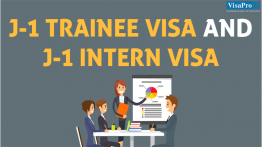Introduction
The J-1 Exchange Visitor category was introduced in 1961 in an effort to enhance understanding between the people of the U.S. and the people of other countries through educational and cultural exchanges. U.S. institutes of higher learning have greatly benefited from the program by attracting top faculty and researchers. Their coming on J-1 visa ensures that the students equip themselves with the international viewpoint of the subject of their interest. But there is a popular misconception among many people that the J-1 visa is only relegated to study and research and is nowhere related to working; a misconception which we will try to clarify.
The J-1 program allows individuals to enter the U.S. under the following categories:
- Professor
- Research Scholar
- Short-Term Scholar
- Specialist
- Alien Physician
- Teacher
- Trainee
- Summer Work Travel
- Students (Secondary/High School)
- Students (College/University)
- Au Pair
- Camp Counselor
- Government Visitor
- International Visitor
The J-1 Intern/Training category is a two-way mutually beneficial process which
- Provides businesses across the U.S. with support staff to fill seasonal and international trainee positions
- Allows foreign national students, trainees, interns, and seasonal staff to work and earn money, while experiencing the U.S. culture
J-1 Trainee Program Overview
Through the J-1 training program, “trainees” are currently allowed to stay in the U.S. for up to 18 months, giving them the opportunity to enhance their skills in their chosen career field through participation in international internships and professional training opportunities. These are intended to improve their knowledge of American techniques, methodologies, or expertise within their field of endeavor.
This training is not supposed to duplicate a trainee participant’s prior training and experience. Through this program foreign nationals have had the opportunity to work and train with some of the finest employers in the U.S., gaining real time experience in their area of interest. One of the industries that has made good use the J-1 trainee program in the past is the tourism and hospitality industry: providing training in hospitality and restaurant management, food and beverage management, accounting and finance, human resources, front desk operations, information technology, and marketing and sales.
The Department of State (DOS), which runs the J-1 program, has recently revised its regulations regarding trainees and interns to, among other things, eliminate the distinction between “non-specialty occupations” and “specialty occupations,” establish a new internship program, and modify the selection criteria for participation in a training program. These new regulations, effective July 19, 2007, change several aspects of the Intern/Training program.
Regulations That Were Effected In The Intern/Training Program
For J-1 Interns:
The new intern regulations permit only those foreign nationals who
- Are currently enrolled in and pursuing studies at a degree-or certificate-granting post-secondary academic institution, or
- Graduated from such an institution no more than 12 months prior to their exchange visitor program begin date to participate in an internship program.
Internships must be related to the participant’s field of study.
For J-1 Trainees:
The new trainee regulations require that to be eligible to participate in a training program, trainees must have either:
- A degree or professional certificate from a post-secondary academic institution outside the United States and at least one year of prior related work experience in their occupational field acquired outside the United States, or
- Five years of work experience outside the United States in their occupational field.
While there is still some confusion over how the new regulations will apply and how they will actually change the J-1 program, the Department of State explaining their position on the purpose and scope of the new regulations, stated that the:
Regulations strictly prohibit the use of the trainee category for ordinary employment purposes, stating in particular that sponsors must not place trainee participants in positions that are filled or would be filled by full-time or part-time employees. At the same time, the Department recognizes that work is an essential component of on-the-job training, and that in many respects there are no conceptual or legal distinctions between an employee and a trainee. These two perspectives are not inconsistent. While a trainee is performing work as a component of his/her training experience, the work is only a part of the learning program that is designed to enhance the trainee’s skills in his/her occupational specialty through exposure to American techniques, methodologies, and expertise.
The Department will designate training and internship programs in the following occupational categories: Agriculture, Forestry, and Fishing; Arts and Culture; Aviation; Construction and Building Trades; Education, Social Sciences, Library Science, Counseling and Social Services; Health Related Occupations; Hospitality and Tourism; Information Media and Communications; Management, Business, Commerce and Finance; Public Administration and Law; and the Sciences, Engineering, Architecture, Mathematics, and Industrial Occupations.
The regulations prohibit sponsors from placing trainees or interns in unskilled or casual labor positions, in positions that require or involve child care or elder care, or in any kind of position that involves patient care or contact. Further, sponsors must not place trainees or interns in positions that involve more than 20 per cent clerical work during their programs.
The Continuing Benefits of The J-1 Visa
There are a number of benefits that can still be gained through the J-1 program; however, those benefits will vary according to the program the foreign national participates in.
- On-the-job training
- Trainee can receive financial support from both U.S. and foreign sources
- No need for the foreign national to work as an employee of a foreign employer
- Ensures productive employment (to the extent allowed by the training program)
- Not required to demonstrate that the training is not available in the country of origin (like the H-3 trainee program)
- Does not require approval of petition by USCIS before the foreign national applies for a visa
- The foreign national applies directly to the U.S. Consulate for the J-1 visa with Form DS-2019
- Can take advantage of U.S. tax benefits: exempt from FICA contributions, and may benefit from specific tax treaty provisions exempting J-1’s from U.S. taxation altogether for defined periods
- Dependents of J-1 may be eligible for employment authorization upon entry into the U.S. in J-2 status

My Case Scenario
Alex
Let’s take a quick look at how some of these benefits may apply. Take, for example, a company that ships its goods worldwide. One of its foreign customers wants to send a representative, Alex, to the U.S. company to obtain on-the-job training in a product or service. If the training would last longer than 3-6 months it may be difficult to obtain a B-1 visa for Alex, and unless there is a qualifying relationship between the companies, Alex would not qualify for an L-1 visa, finally it is very time consuming and complex to apply for an H-3 training visa.
The J-1 training category is a quick and simple solution. The U.S. Company can establish a relationship with an approved J-1 sponsor to issue the DS-2019 to the foreign representative who can then obtain the visa and come to the U.S.
Establishing A J-1 Training Program
U.S. companies and organizations who want to include trainees and interns as a part of their regular schedules have two options. The first, like in the example above, is to establish a relationship with an approved J-1 sponsor. The second is to develop own training program and complete the J-1 authorization process. Once the program designation has been received, the company receives what amounts to a “blanket petition approval” to bring in foreign nationals at will, subject to the program limitations as set out in the request for designation or by the State Department. It is important to remember that whenever an employer-employee situation arises, an H-1B visa might also be suitable route to use.
Changing From J-1 To H-1B
For an H-1B visa, a petition must be approved by the USCIS before the foreign national can apply for a visa or begin working in that capacity. A foreign national in J-1 status can switch to an H-1B once the employer has the approved petition. However, before filing the H-1B petition the employer must first make sure that the foreign national in not subject to the 2-year home country requirement (certain individuals entering the U.S. in J-1 visa status must return to their home country or country of last residence for 2 years before they can obtain an H-1B, L-1 or immigrant visa; however, several waivers are available). If the foreign national is not subject to that 2 year requirement they can go ahead and file the H-1B petition.
A J-1 student who has finished a course of study, and any approved academic or practical training following conclusion of studies, is permitted an additional 30-day period to arrange for travel. The J-1 student is considered to be maintaining status through the end of this 30-day period, so any petition filed on his behalf is considered to be timely filed.
In case of an H-1B petition filed on behalf of a J-1 nonimmigrant being denied:
- Within 30 days of his/her completion of studies or program or training, the foreign national and dependents (if any) may complete his or her respective 30-day grace period before departing the U.S…
- After the 30-day grace period, the foreign national’s J-1 status is cancelled and he/she, and dependents (if any), must immediately leave the U.S.
Conclusion
Many challenges face U.S. employers that wish to fill temporary or seasonal intern positions with foreign nationals, or who wish to provide training to foreign nationals. Whereas there are several solutions; J-1 visa is one of them and is available year-round.
Globalization has made these visa options a necessity for many U.S. employers, whether they are currently in the global marketplace, seeking to enter the global marketplace, or just need summer interns. Consequently, anyone looking in this direction must understand the nature of the work or training program involved, and the future goals of the employer and foreign national. The selection of the appropriate visa category for the internship/training depends on the prospective trainee’s background and the employer goals.
As the petition process for a particular visa classification, i.e., H-3 or a J-1, may be time-consuming and demand substantial documentation, the employer must be sure of the direction he/she chooses to take. Moreover, the choices taken may subject both prospective trainees and U.S. companies to high levels of scrutiny by USCIS, DOS, and CBP. The trainee visa options (H-3 and J-1) are not intended to bypass the restrictions found in other temporary employment visa categories and should be used with the training purpose clearly in mind.
Contact VisaPro if you have any questions regarding J-1 or H-3 process. Our experienced attorneys will be happy to assist you.
We cover the latest happenings on employment and family visas in Immigration Monitor, our monthly newsletter. Click here to subscribe to Immigration Monitor.
What VisaPro Customers Are Saying
Our applicant did indeed pass her [J-1] visa interview. She will be arriving in America later this month. DisplayCraft appreciates everything that Visa Pro have done for us. We are extremely satisfied will your efforts and I am confident that DisplayCraft will come back to Visa Pro in the future should we need to obtain a visa for another foreign employee."

 Brent Wingfield, DisplayCraft, Inc
Brent Wingfield, DisplayCraft, Inc



